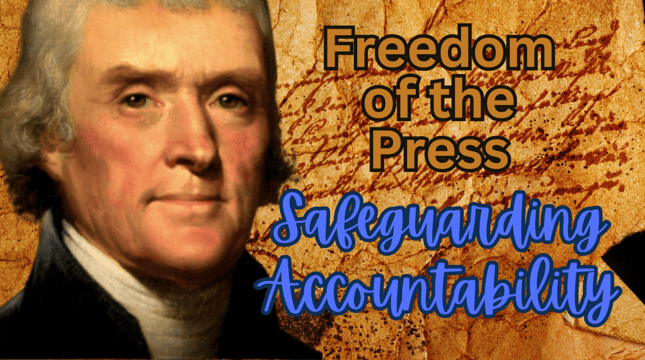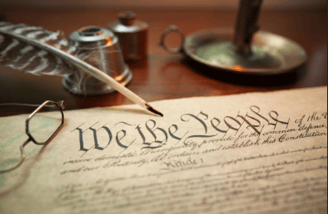Our Constitution and the Freedom of the Press: Safeguarding Accountability
The First Amendment of the United States Constitution enshrines the freedom of the press as a fundamental right. This cherished freedom is not only a pillar of our Constitutional Republic but also a safeguard against governmental overreach. In this article, we will explore the historical context of freedom of the press, it’s essential role in upholding Constitutional values, the changing landscape of media, and how responsible journalism is vital for the wellbeing of the nation.
Casey Adams
10/4/20233 min read


Colonial Beginnings and the Power of the Press
The origins of press freedom in the United States trace back to colonial America, where early newspapers became vital tools for dissent and political discourse.
By the 17th and 18th centuries, settlers fleeing persecution established communities where print media became essential for communication.
The 1735 trial of John Peter Zenger, who was acquitted for publishing criticism of the colonial governor, set a crucial precedent by establishing truth as a defense against libel.
This case demonstrated the press’s role in challenging authority and laid the foundation for protecting journalistic freedom.
The Enlightenment’s Influence
The Enlightenment, with its emphasis on reason and individual liberty, profoundly shaped America’s commitment to a free press.
Thinkers such as John Locke and Voltaire championed the press as a means of holding governments accountable and fostering an informed citizenry.
These principles resonated with the Founding Fathers, influencing the inclusion of press protections in the First Amendment.
Recognizing that a well-informed populace is critical to self-governance, they enshrined these values in law, ensuring that the press remained a check on power.
The First Amendment: A Shield Against Censorship
Ratified in 1791, the First Amendment explicitly protects the press from government interference:
"Congress shall make no law... abridging the freedom of speech, or of the press."
More than a legal provision, this amendment reflects a commitment to an independent press that can scrutinize those in power without fear of reprisal.
By preventing censorship and governmental control, it ensures that the press remains an essential institution for transparency in the press.
The Press as Society’s Watchdog
Ensuring Transparency
The press plays a critical role in maintaining transparency by investigating government actions, public policies, and financial decisions.
By exposing corruption and inefficiency, journalists empower citizens to make informed decisions and hold leaders accountable.
The Fourth Estate
Often called the "Fourth Estate," the press operates as an additional check within the balance of power, ensuring that the legislative, executive, and judicial branches are subject to scrutiny.
By providing analysis and diverse perspectives, the press fosters informed debate and public engagement.
Modern Challenges to Press Freedom
The Rise of Disinformation
The digital era has expanded access to information but also facilitated the spread of disinformation.
Social media platforms, driven by algorithmic engagement, can amplify false narratives, undermining public trust in reliable news sources.
This phenomenon has contributed to skepticism toward mainstream media, with audiences shifting toward independent platforms.
The Economic Struggles of Journalism
Traditional journalism faces financial strain due to declining print revenue and digital ad competition.
Investigative journalism, a cornerstone of accountability, suffers as resources shrink, raising concerns about the media’s ability to sustain in-depth reporting.
Landmark Supreme Court Cases
Near v. Minnesota (1931)
This case set a precedent against prior restraint, affirming that government censorship of the press is unconstitutional, even when content is controversial.
It reinforced the principle that the press must remain free to operate without governmental suppression.
New York Times v. United States (1971)
This case, commonly known as the "Pentagon Papers" decision, reaffirmed the press’s right to publish classified documents that expose government wrongdoing.
The Supreme Court ruled that prior restraint could not be justified without direct evidence of a national security threat, further cementing the press’s role in government accountability.
Navigating the Digital Age
The Evolution of Journalism
The internet has revolutionized journalism, enabling instant global access to information.
While this shift has democratized media, it has also introduced challenges, including the proliferation of echo chambers where individuals encounter only information that aligns with their biases.
Addressing Media Literacy
In an era where misinformation is rampant, media literacy is essential.
Educating the public on distinguishing reliable journalism from misleading content strengthens democracy by fostering critical thinking and informed decision-making.
Conclusion
Press freedom remains a cornerstone of America, evolving alongside technological and societal changes.
While modern challenges—such as digital disinformation and economic pressures—threaten its integrity, the foundational principles of a free press endure.
By upholding transparency, accountability, and journalistic integrity, the press continues to empower citizens, ensuring the vitality of democratic governance.
Freedom of the Press



